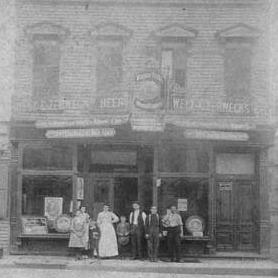There is perhaps no section in the state of New York where less restrictions are imposed upon the sale of liquor than in the town of Newtown, a large part of which borders upon this city. In fact there is no restriction at all as long as the seller has a license. This, until the past year, could be easily procured, which will be explained further on. Newtown has a population now, it is carefully estimated, of 30,000. The township comprises the villages of Ridgewood, Glendale, Middle Village, East Williamsburgh, Maspeth, Columbusville, Newtown Village, Corona, Winfield, Woodside and Bowery Bay. In all there are about 23,000 to 24,000 acres of land. The seat of government is the Newtown Village, where the town hall is situated and in which building are located the offices of the town officials. None of the villages is incorporated and so the same set of officials have power throughout the whole town. A police justice, whose duty is similar to that of the Brooklyn officials, also holds daily court to try criminal cases, no other unincorporated town on Long Island electing such an official. The governing force is composed of a supervisor, town clerk, three assessors, three highway commissioners, four justices of the peace, two overseers of the poor, a board of audit, five constables and an excise board of three members, beside a few minor officials. All are paid by fees, with the exception of the town clerk, who is paid a salary and also receives fees.
The excise board, under the law, can hold but twelve meetings each year for which they receive pay. This is allowed them by law in the sum of $3 a session, so that each member’s salary, if all the twelve meetings are held, and it has never been known otherwise, would only amount to $36 a year. A license costs but $30 and until the past year all an applicant had to do was to file his papers and he would receive the parchment at once. When the present excise board met and organized last spring several dealers were refused licenses, but they kept on selling without hindrance from the board. At first it was claimed that the refusals were made by the excise board on account of the politics of the applicants, but later developments showed that this was not so. To cut a long story short, two of the members of the excise board are now under indictment by the Queens county grand jury for demanding bribes to issue licenses and in some cases of accepting the same. Both the members were arrested and are now on bail awaiting trial at the next session of the county court. Notwithstanding that the excise board had refused to grant several licenses the books in their office show that they have granted, up to date, 394 licenses.
As said before, no restriction whatever is placed upon the liquor seller. Upon a Sunday every drinking place is wide open and a visitor upon that day in any section of the town in the warm weather would find not only the doors and windows open, but would also notice that the screens ordinarily used upon a week day were removed. In no part of the town would this be more noticed than in Newtown Village, where are situated the Presbyterian, Methodist Episcopal, Reformed Dutch and Episcopal churches, all fine edifices, their worshipers including the best people of the township, who see the violation of the law, but apparently pay no heed to it.
Ridgewood, the village nearest to Brooklyn, has any number of parks, in the largest of which order is preserved by the very men who are sworn to arrest all violators of the law, the excise law included. Beside the parks are numbers of small beer gardens and one or two alleged hotels, the magnitude of whose patronage in the winter is contingent upon the number of prize fights held in their ball rooms. A Baptist church is also situated in the village and it is a fact that in order to hold service on different Sundays last summer police protection had to be asked by its members. The other villages are about in the same category, but are freer from the nuisance than Ridgewood.
A peculiar fact is that most of the officials of the town are either keepers of saloons or ex-keepers.
Once in a while the Newtown ministers become indignant and call the attention of their congregations to the violation of the law. The latter then pass a series of resolutions, which are printed in the town newspapers, and then – that’s all.
It is but fair to add that the great number of the saloons are not supported by the people of Newtown, their custom coming mostly from the cities, Brooklyn especially. As a liquor dealer once said to the writer, “Raise the license to $50, enforce the Sunday law and I will warrant that the number of saloons in the town of Newtown will decrease to 100 in four weeks.”
But as it is now, convivial Brooklynites will not have far to go to get a drink if the strict enforcement of the law in this city is gained by Dr. Lyman Abbott and the others interested with him in that purpose. A trolley car will rapidly take them to some part of Newtown, where they can ride themselves to one of the officials’ establishments and drink secure, confident of being protected while a nickel remains in their pockets.


